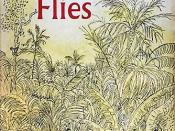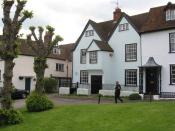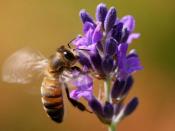The Apple doesnÃÂt Fall Far From the TreeÃÂI think of myself as a religious manÃÂ said William Golding over fifty years ago, and still today his piousness echoes in his masterpiece Lord of the Flies. In this tale of young English boys stranded on a desolate island, the British author makes many deliberate and powerful connections to western religion. Through the use of diction and characterization, Golding makes powerful correlations between the Bible and his novel. By the rendering of Simon as Christ, Jack as Satan, as well as the descriptive imagery relating to the island, GoldingÃÂs borrowing from western religion is most apparent.
The characterization of Simon, as well as the diction Golding uses for him, supports the idea that Lord of the Flies has strong roots in western civilization. Simon is depicted as being the equivalent of Jesus on the island, through his actions, and description. Simon is prophetic, encouraging, and sees manÃÂs potential to be evil, just as Jesus saw man being the source of sin.
The connection between SimonÃÂs words: ÃÂWhat I mean is . . . Maybe itÃÂs only us . . .ÃÂ(Golding 77) and the words of Jesus ÃÂEnter ye in at the strait gate: for wide [is] the gate, and broad [is] the way, that leadeth to destruction, and many there be which go in thereat:ÃÂ(Matthew 7:13) is that both these quotes show that evil and wickedness are in manÃÂs nature, and that it is easier to do good than evil. Also, many other actions of Simon such as his meditating in the meadow, and his helping of the littluns, are very similar to actions of Jesus, such as his praying in the garden, and his helping and healing of all those around him. Simon is even described as being unearthly, as...


